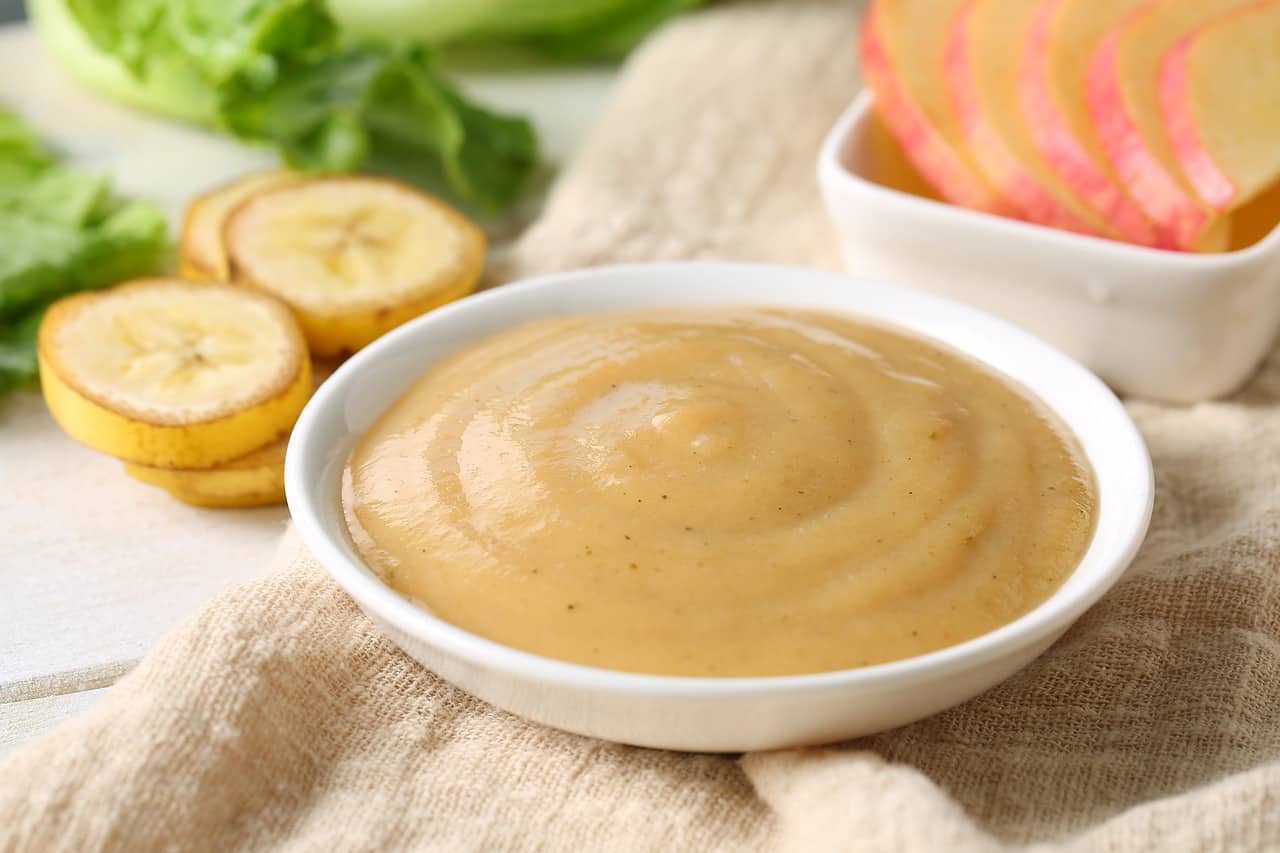Now, your baby, who has blown his first candle, is no longer eating like a baby, but he is not ready to eat like an adult too. What are the peculiarities of a one-year-old baby's food?
1. Baby's food at 12 months, the baby is not yet eating like adults
At 1-year-old, a baby has particular nutritional needs. He cannot yet share the family menu without differentiation. For example, he should not eat as salty or as sweet as an adult. For the proper maturation of his brain and his growth, he needs particular nutritional contributions of essential fatty acids through vegetable oils (a mixture of rapeseed and sunflower oil, or even walnut oil ), iron, and calcium.
2. Baby’s food for the 1-year-old baby
From the height of 12 months, your baby is gaining in autonomy. He can now move perfectly, whether on all fours or perhaps even when taking his first steps. At the table, he is curious and ready to taste whatever you want to give him. Especially since he chews more or less large pieces better and better, thanks to his incisors and his first molars.Concerning the plate contents, a one-year baby's food can now contain all fruits and vegetables. You will choose them, preferably in season and fresh. But frozen vegetables can be a great way to prepare the baby's food if you are short on time. In this case, opt for plain, uncooked vegetables and possibly fruit without added sugars. The same is true for starchy foods, particularly potatoes, sweet potatoes, split peas, or dried beans. However, avoid canned foods that contain too much salt.As for proteins, you can offer your child any type of meat (white or red), fish (fatty or not), and both white and egg yolk. This month, you will increase the amount of protein: from 12 months, you will increase to 25 to 30 g in a total of meat or fish, or 5 to 6 teaspoons per day or 1/2 hard-boiled egg (white + yolk).
3. Baby’s food; milk
It remains the keystone of your child's nutrition until he is 3 years old. Guaranteeing a good intake of calcium, iron, and essential fatty acids, cow's milk is essential. You should not take the liberty of excluding it from your child's meals without checking with a doctor. As an amount, we recommend giving a child aged between 12 and 18 months, approximately 500 ml of milk per day (in the form of drinkable milk or milk products).
4. Baby’s food Textures
No more purees. In fact, purees should be a thing of the past for a few months now, because if you keep them too long, the child may refuse the textures. Anyway, now is the time to move on to the pieces (if you haven't already).Offer very tender foods, cut into small pieces, and encourage your child to eat them alone. Well-cooked or tender vegetables, such as avocado. Grated vegetables, such as zucchini or carrot, tender meat, poultry and fish, tofu, legumes, egg, pasta, bread crust, and grated cheese, are all foods your child can take with his little fingers. And when food needs a utensil, let your child try using the spoon. Children aged 1 to 2 not only like to have a little independence, but they also need to develop fine motor skills.Related: What is the ideal healthy diet for diabetics people?
5. Baby’s food; foods with more risk of food poisoning
Such as raw fish, alfalfa sprouts or soybeans, raw eggs are not suitable for the baby. He is more likely than adults to suffer complications from contact with harmful bacteria because his immune system is not fully developed. Besides, the baby's stomach produces less acid, which can neutralize unwanted bacteria.
6. Baby’s food; Foods that pose a choking risk
That is, foods that are small, hard, round, or sticky. This is why you should avoid giving the baby nuts, peanuts, whole raisins, or fresh, raw hard vegetables (carrot, celery, turnip, etc.), popcorn, hard or sticky candies, sausage. Sliced or whole, a stick of cheese or a piece of fresh bread. Raisins can be incorporated into a muffin recipe because they get moisten in this way. The bread should be toasted, as the crumb of fresh or sliced bread tends to form a compact ball in a child's mouth.
7. Baby’s food; a menu for baby’s food from 1 to 2 years old
The morning:
A feed or bottle of liquid growth milk, between 250 and 300 ml, or powdered growth milk which usually does not contain sugar or vanilla: 240 ml of weakly mineralized water with 8 measures or 270 ml (9 measures).With 2 tablespoons of 2nd age cereals with gluten, possibly chocolate.It is possible to add a biscuit or toast (butter, jam, honey, etc.).Fruit juices are not essential, but they can be offered in small quantities in the morning or combined with dessert at midday (although pure water is preferable): preferably freshly squeezed fruit juice, or “100% fruit juice” without added sugar.
Lunch:
Mashed vegetables in small pieces + unmixed but well-cooked starches + 1 tsp of oil, about 200 g to be adapted according to your appetite.25 to 30 g of protein: 5 to 6 tbsp of meat or fish or 1/2 hard-boiled egg (white + yellow)Fresh fruit, preferably chewable.
At 4 p.m:
A feed of milk and / or a yogurt, specific for young children (they are preferable to other dairy products because they comply with the regulations of foods intended for young children; their protein content is reduced, and they can be fortified with iron, essential fatty acids, etc.)With a biscuit (petit beurre, biscuit with a spoon, cat's tongue), or a toast (butter, jam, honey, etc.).And fruits, raw or cooked.
Dinner:
Mashed vegetables in small pieces + unmixed but well-cooked starches + 1 tsp of oil, 130 to 200 g depending on your appetite.Breastfeeding or bottle of 240 ml of growth milk with weakly mineralized water
Optional: Infant cereals (in the bottle)
Regarding proteins (meat, fish, or egg), you do not have to give it to your only lunch or only in the evening. The important thing is not to exceed the recommended amount of 25 to 30 g of protein per day. This corresponds to about 5 to 6 teaspoons of meat or fish or 1/2 of a hard-boiled egg (white + yolk). You can, therefore, perfectly divide this quantity in two, between the midday meal and that of the evening.
- Touristic sites and guidelines for travel in Mexico
- Travel guide, what to know before traveling to Vietnam
- Cooking definition and the important cooking techniques
- What are the Important things to know before you travel to China
- Health and well-being; how to live in good harmony with your body?
Originally published on Live Positively.






